Minister of Natural Resources, Raphael Trotman has admitted that he deliberately stalled the passage of the Petroleum Commission Bill. The draft law is essential for the establishment of the Petroleum Commission which would supervise Guyana’s nascent oil sector.
However, Minister Trotman recently told a Parliamentary Committee that he made a decision to stall the Bill based on widespread concern about its numerous flaws.
“I deliberately stalled the Petroleum Bill because of its weaknesses,” said Trotman.
He said, “The Petroleum Commission Bill was deliberately stalled by me because many comments were made. The IDB (Inter-American Development Bank) and the World Bank Board asked to make presentations to the government on the bill. The last such presentation came to an end in February.
“We are in the process of making final adjustments and are likely to return to the House very soon with an amended Bill which I believe will reflect all of the views, including those on the powers of the minister being too many.”
Trotman told Guyana Standard that he wants the Petroleum Commission to move from a semi-autonomous agency to one that will be more independent and inclusive “so that it can enjoy national support.”
The opinion that too much power is to be vested in the Minister of Natural Resources is widespread.
Stakeholders have been saying that the Petroleum Commission Bill, with some 51 clauses, should be fine-tuned to make way for a Board of Directors with broader powers to eliminate concerns about possible ministerial micro-management.
When it was being debated, before being sent to the Special Select Committee, the political Opposition argued that it vests too much power in the Minister, and should be adjusted to reflect an apolitical stance of the sector.
Opposition Parliamentarian, Irfaan Ali had argued, “When we examine Section Eight which deals with the Power of the Minister to give directions to the Commission, it is clear that the Commission will hardly be able to work without the direction and control of the Minister. According to Section Eight, the Minister is not only allowed to provide policy guidance, but also give direction to the Commission regarding, size of the establishment, the employment of staff and the terms and conditions of employment…”
The People’s Progressive Party Member contended that the Minister is literally empowered to dictate inter alia, how many persons an independent Commission should employ, what should be the terms and conditions of employment for the staff of the Commission, and how an independent Commission should use its funds, etcetera.
When compared to similar legislation in other countries, Ali said that Guyana’s Petroleum Commission Bill stands alone in granting excessive powers to the Minister.
He noted in other jurisdictions, the Minister only has authority to provide policy guidance.
The Petroleum Commission Bill remains before a Special Select Committee of Parliament.











